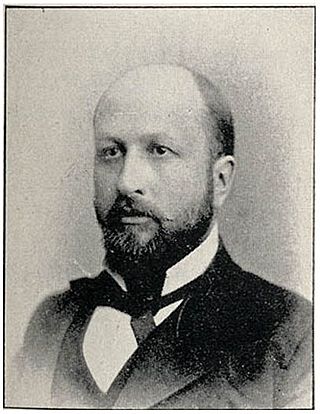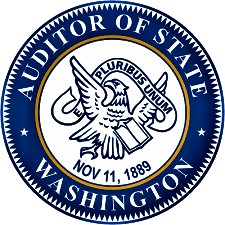
The state controller of California is a constitutional office in the executive branch of the government of the U.S. state of California. Thirty-three individuals have held the office of state controller since statehood. The incumbent is Malia Cohen, a Democrat. The state controller's main office is located at 300 Capitol Mall in Sacramento.
The state auditor of North Carolina is a statewide elected office in the U.S. state of North Carolina. The state auditor is a constitutional officer responsible for overseeing and reviewing the financial accounts of all state government agencies. The auditor also conducts performance audits of state agencies, ensures state agencies' accounting conforms with Generally Accepted Accounting Principles, evaluates the integrity of computer-generated information, and investigates the misuse of state funds or property. The incumbent is Dave Boliek, who became state auditor on January 1, 2025.
A comptroller is a management-level position responsible for supervising the quality of accounting and financial reporting of an organization. A financial comptroller is a senior-level executive who acts as the head of accounting, and oversees the preparation of financial reports, such as balance sheets and income statements.

The Cour des Comptes is France's supreme audit institution, under French law an administrative court. As such, it is independent from the legislative and executive branches of the French Government. However, the 1946 and 1958 French constitutions made it the Court's duty to assist the Cabinet and Parliament in regulating government spending. The Court thus combines functions of a court of exchequer, comptroller general's office, and auditor general's office in common-law countries. It is also a Grand Corps of the French State and mainly recruits among the best-ranked students graduating from the Ecole nationale d'administration.

The state auditor of Minnesota is a constitutional officer in the executive branch of the U.S. state of Minnesota. Nineteen individuals have held the office of state auditor since statehood. The incumbent is Julie Blaha, a DFLer.

Marshall Monroe Kirkman was an American authority on railways, who wrote extensively on the subject of railways.

The New York state comptroller is an elected constitutional officer of the U.S. state of New York and head of the New York state government's Department of Audit and Control. Sixty-one individuals have held the office of State Comptroller since statehood. The incumbent is Thomas DiNapoli, a Democrat.

The Oklahoma State Auditor and Inspector is an elected Constitutional officer for the U.S. State of Oklahoma. The State Auditor and Inspector is responsible for auditing and prescribing bookkeeping standards of all government agencies and county treasurers within Oklahoma. The office in its current form is a consolidation of the office of State Auditor with that of the office of State Examiner and Inspector, both of which dated back to statehood in 1907. The two positions were combined in 1979 after passage of State Question 510 in 1975. Tom Daxon was the first person to hold the combined office and the first Republican as all previous occupants of either position were Democrats.

State auditors are fiscal officers lodged in the executive or legislative branches of U.S. state governments who serve as external auditors, program evaluators, financial controllers, bookkeepers, or inspectors general of public funds. The office of state auditor may be a creature of the state constitution or one created by statutory law.
The Office of the Auditor General Manitoba—known as the Audit Office (1876–1916), Office of the Comptroller-General (1916–69), and Office of the Provincial Auditor (1969–2001)—is an independent office of the Legislative Assembly of Manitoba whose stated purpose is to assist Members of the Legislative Assembly with matters such as accountability and the performance of government.

The Comptroller of Illinois is a constitutional officer in the executive branch of government of the U.S. state of Illinois. Ten individuals have held the office of Comptroller since the enactment of the Illinois Constitution of 1970, replacing the prior office of Auditor of Public Accounts that was first created in 1799. The incumbent is Susana Mendoza, a Democrat.
Auditor of the Imprests was a profitable office of the Exchequer, responsible for auditing the accounts of officers of the English crown to whom money was issued for government expenditure, from 1559 to 1785.

The Arkansas state auditor is a constitutional officer within the executive branch of the U.S. state of Arkansas. Thirty-five individuals have occupied the office of state auditor since statehood. The incumbent is Dennis Milligan, a Republican who took office in 2023.

The Arkansas Secretary of State is one of the elected constitutional officers of the U.S. State of Arkansas.
Texas State Treasurer was an elected constitutional officer in the executive branch of the state government of Texas, responsible for overseeing the financial operations of state government. The position was established in the Constitution of 1876. It was officially abolished on August 31, 1996.

The state auditor of Washington is an independently elected constitutional officer in the executive branch of the government of the U.S. state of Washington. Eleven individuals have held the office since statehood. The incumbent is Pat McCarthy, a Democrat and the first woman to occupy the office.

The Nevada state controller is a constitutional officer in the executive branch of government of the U.S. state of Nevada. Twenty-two individuals have held the office of State Controller since statehood. The incumbent is Andy Matthews, a Republican.

The auditor of public accounts of Nebraska, more commonly known as the "state auditor", is an elected constitutional officer in the executive branch of the U.S. state of Nebraska. Twenty-five individuals have held the office of auditor of public accounts since statehood. The current auditor is Mike Foley, a Republican.
The state auditor of West Virginia is an elected constitutional officer in the executive branch of the U.S. state of West Virginia. The incumbent is Mark Hunt, a Republican.
The Government of the U.S. State of Nebraska, established by the Nebraska Constitution, is a republican democracy modeled after the Federal Government of the United States. The state government has three branches: the executive, the legislative, and the judicial. Through a system of separation of powers, or "checks and balances," each of these branches has some authority to act on its own, and also some authority to regulate the other two branches, so that all three branches can limit and balance the others' authority. The State Government is based in Lincoln, the capital city of Nebraska.












